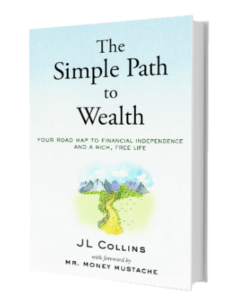
Jim Collins, also known as popular blogger JLCollins, has been financially independent since 1989.
He achieved this in the simplest way possible: he saved half of his income and invested in index funds. That’s it.
Jim says that if your goal is to build financial freedom, the simplest possible approach is the best.
“The great irony of investing is the simpler of an approach you use, the more powerful of results you get,” he tells us during this in-depth interview.
In this episode, Jim shares the details of his ultra-simple investing approach. He says that when you prioritize simplicity above all else, you can ignore your investments and move on with your life:
“Most people don’t want to think about this stuff all the time. Most people want to get on with curing diseases and building bridges and writing peace treaties,” he says. “But the smart ones know they have to have some kind of handle on their money.”
Learn Jim’s ultra-simple path to wealth in this week’s episode.
Jim’s new book A Simple Path to Wealth is getting rave reviews on Amazon.
